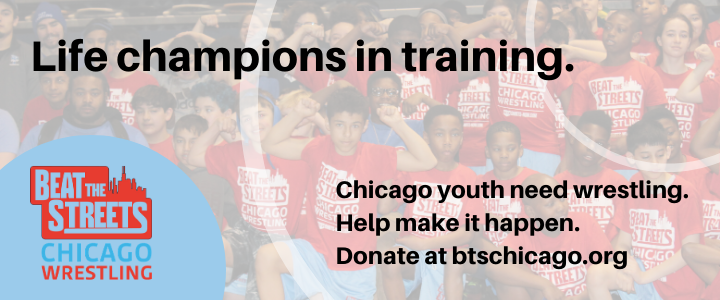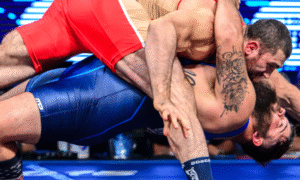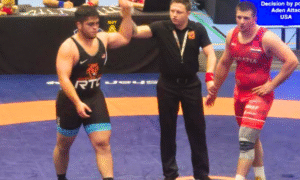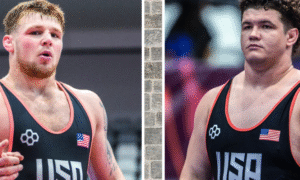The one thing you do know is that you’d like to have about 100 more just like him.
Maybe it shouldn’t have been a surprise, but it was, when Chandler Rogers (87 kg, TMWC) showed up for Greco at the 2018 U23 World Team Trials. Even though he says now that originally he entered “just for fun”, you have to wonder if his well of confidence was deeper than he’s letting on. Rogers — an All-American as a sophomore for Oklahoma State and a Junior Fargo Greco champ in 2014 — might not have held enormous expectations heading into Akron two years ago, but it’s hardly likely he showed up copacetic with the idea of getting mauled.
Wrestlers like Rogers always figure they’ll find a way to at least stay in the argument. In Akron, he did even better than that. Not only did he advance to the semifinal only to drop a hard-fought decision to eventual runner-up (and Junior World silver) Andrew Berreyesa (NYAC/FLWC) en-route to third, Rogers also came away with the realization that a post-collegiate career in the classical style would fit him like a glove. He had hardly prepared; was barely able to make weight; wrestled on little rest and no food; and still managed to garner just as much attention as some of the Trials champs themselves. Not everyone can do such a thing. Contrary to what some hardcores claim, American Greco folks do become excited whenever a D1 collegian bothers to join their precious eco-system.
After his final season at Oklahoma State reached its conclusion, Rogers put together a sparkling showing at the US Open that drew even more eyeballs. He opened with a close loss to the resurgent Jake Fisher (77 kg, Curby 3-Style) and then proceeded to run the table on the bracket’s back-end, scoring wins over Army’s Vlad Dombrokskiy, U23 World Teamer Carter Nielsen (Minnesota Storm), and Terrence Zaleski (Marines). When the dust cleared, Rogers exited Vegas with a 4-1 record, third place, and three victories via tech fall.
What happened next? More progress, more signs, more reasons to hone in on an athlete who was gradually growing into his full-time role. Rogers was giving John Stefanowicz (77 kg, Marines) all he could handle in the first round of the World Team Trials until a late score in the other direction turned the tide. He then ran into Berreyesa again the following week in the finals of the U23 Trials and was defeated in two straight bouts. In between were plenty of victories, except no one pays much mind to those, especially not after the bar had been raised. So, Rogers was forced to shutter the season knowing he had made enormous strides before looking forward to zooming towards the Olympic Year on a high note.
The opportunity to get his point across arrived with the opening tournament of this latest campaign for most US Seniors. With Olympic Trials qualification on the line at the Bill Farrell Memorial in New York, Rogers was the highest-placing American in his weight category, closing the show with a quick pin over Japan’s Satoki Mukai for bronze.
He was on pace for another big performance at the Nationals in December until Jon Anderson (Army/WCAP) eeked out a decision. Rogers didn’t wrestle again that tournament, his bid for the Trials had been secured a month prior. And like so many others, he hasn’t stepped on a competitive mat ever since. It bears noting that in the 15 wins Rogers has recorded dating back to those ’18 U23 Trials, his VFR is 100%. Yikes.
These are strange times, for Rogers and everyone else. There is equally a lot going on and nothing at all. Brains are enduring more workouts than bodies, just churning away nonstop, one thought and hypothetical on which to ruminate after another. And another. And another. Athletes are riding on a carousel of What if’s?, and the lack of certainty is uncomfortable. Rogers, who turns 24 this week, like most, is caught in between. On one hand, there is the more-than-promising Greco career; on the other, a body that is currently not cooperating with the workload.
Perhaps that changes. Or doesn’t. Either way, for as sketchy and replete with question marks as this interim has been, there is no detection of anxiety. Rogers easily settles into his faith and allows his loving trust in God to quiet his mind and still his heart. The future? What is that? A figment of the imagination. He leaves all that noise for his Savior to handle. In the meantime, he is taking it a little easy in Oklahoma, content with the knowledge that storms do indeed pass while reflecting on the beginning of a venture that, thus far, has certainly provided its fair share of impressive moments.
5PM Interview with Chandler Rogers
5PM: The ’18 U23 Trials is when your time as a Senior competitor began. What was your thinking at the time as far Greco becoming a career pathway?
Chandler Rogers: I’ve always treated Greco as kind of a secondary sport. It was more like a hobby of mine. It was, This is so fun to try Greco, because it tests your knowledge and abilities as a wrestler. It is easy to go from folkstyle to freestyle because, Oh, I can still shoot on the leg, and if I want to, I can just cut the guys. That’s about it. But in Greco, it is a lot different. It tests your abilities to score on someone without touching their legs, you have to think of all of these different ways. That’s why I always loved it. It challenged my mind, challenged my abilities, and it’s just a different sport.
When I was going to that tournament, I was going just for fun. There were some bad storms and I ended up getting two hours of sleep that night because I was on plane rides, walking through airports and sitting in airports. Still cutting weight, trying to get down to weight for the tournament. I got to Akron two hours before weigh-ins started. I fell asleep, woke up, and had about 30 minutes to run and get some weight off. I barely made weight, the coaches didn’t think I was going to make weight. I was three pounds over with 30 minutes to lose it. I made weight, but they didn’t get me any food or water, so I basically had no food or water for the day after cutting weight.
I started that tournament in the worst position possible (laughs). But the reason why I felt like I still did very well is because I was having so much fun. I didn’t go in with any pressure or anxiety. I went in like, This is for fun; this is going to be a really big test. I’m going to test my mind and test my abilities — and I’m not going to eat or drink anything and see what I can do (laughs). That was a really fun tournament. That was definitely the start to my Senior Greco experience.
5PM: There is a thing in Greco about college wrestling, college coaches, and participation. You went to a college where the coach (John Smith) also happened to have been the best international wrestler in American history, or at least probably. Was there a reason why prior to U23, Greco wasn’t a major part of your collegiate summers?
CR: I think Oklahoma State, it’s a tough program to go through. And me personally, I do really well when I have time off and come back hungry to wrestle. So I took summers off most of the time because I was just drained from the season. I was just like, I need a break a little bit but when I step back on the mat I’m going to be freaking ready.
I never really thought about doing any freestyle or Greco. I just wanted a break after the college season was over. Which is probably not something I would advise most people to do. It was just how I functioned. A lot of people are like, If I stopped wrestling it would be hard to get back into it. For me, if I take a week off or a couple days off, it’s like, Man, I hate not doing this.
Just being in quarantine right now, I’m like, This is driving me insane. It’s a good thing my father-in-law has a punching bag and some boxing gloves. I’ve been punching this bag everyday just to be somewhat active and somewhat in a fighting spirit (laughs). That is what I’ve been doing in my time here. Like I said, I get hungry to go compete and wrestle when I take time off.
5PM: Were you tempted or advised at all to consider a full-time freestyle career?
CR: It was kind of up in the air. I think that was definitely a push for me. Especially after my senior year, I went to the Pan-Ams and won in freestyle. I was feeling like King Kong in freestyle. Then I went to the US Open for Greco, and with maybe three practices under my belt I took third. I was kind of split between the two. It ultimately came down to where I thought I had the best chance to make the Olympic Team. That was my deciding factor. And obviously, praying and figuring out where God wants me and where the opportunities are. That was all playing a part in where I chose to go and where I chose to be. It was mostly where the opportunities were given to me.
5PM: You said before how Greco is a different kind of challenge. The divide in the US is between folkstyle and Greco. This topic is discussed here frequently. If you were to describe to a newbie or someone unfamiliar, what translates from folkstyle to Greco, and what doesn’t? Aside from leg attacks, of course.
Chandler Rogers: I think what translates from folkstyle to Greco is chain wrestling. There is a lot of chain wrestling in folkstyle where you take a shot, they stop it, and you go to your next move. I think that is a huge part of Greco, chain wrestling. A lot of guys might think it is, Oh, I’m going to throw an underhook, I’m going to get an overhook, lock up, and then I’m going to throw and win the match. That’s stuff that gets you to Fargo. Now, how do you win Fargo? That’s what gets you there, but what it is about is chain wrestling.
Say you hit a drag. It’s not like the guy is going to turn around and go to his belly. You’re going to hit a drag and the guy is going to square up; then you hit a body attack and he backs out, so you snap him down and hit a front headlock; then you try to throw and it may or may not work. It is a lot of chain wrestling that involves Greco.
The other thing that translates from folkstyle to Greco are setups. Which kind of goes along with chain wrestling. I always thought, Oh, it’s just an underhook. But if you don’t set it up, it is a worthless underhook. Basic stuff like that, setups. Footwork. Moving your feet. It is a different type of footwork but you’re still getting to the corner. Those are all big things from folkstyle that you can use in Greco, as well.
But for me, Greco translates better to folkstyle than folkstyle translates to Greco.
5PM: That was absolutely my next question.
CR: In folkstyle, especially in college, when you walk out of bounds it’s a stall call. And when you walk out of bounds in Greco, it could be a passivity and two points. You learn mat awareness in Greco, Where am I on the mat? In folkstyle, you get a guy’s butt to the edge, he is going to want to fight back in and that is when you release pressure and setup your next shot.
Greco translates to hand-fighting. People think Greco is really easy, but if you take dumbbells and curl them for six minutes straight, you’re going to get tired (laughs). That is basically what Greco is. It’s a constant. If you’re not hand-fighting, you are going to get called for passivity and guys are going to get on top of you and throw you on your head. You have to hand-fight the whole time.
So, Greco translates to folkstyle because you have to learn how to hand-fight really well, hold position, and get a hold of things. Feel where the guy’s arms are going. And, learning how to pop your hips and back-arch is something you should know in any style. Freestyle, folkstyle, Greco — that is something you need to know. Learning how to not go to your back after being taken down. In freestyle and Greco, if you get taken down you go to your stomach, not your hands and knees so that you don’t give up four points instead of two. In college, you could be giving up six points if you’re there long enough. You have to learn how to land not in danger. Learn how to float your hips and get out of bad scenarios. There is just so much that I feel translates.
When I was in college, guys who wrestled me felt like they were in danger because I would try to throw them on their heads in the first :30 of each period. That was my reputation. If you can build a reputation where if someone goes up top of you that they are in danger, I think that is a great thing to have in your arsenal. Especially if there is short time and you have to take someone feet-to-back, that’s where Greco comes in. You have to get that four-point throw, or get near-fall points so the team wins the dual. There is a lot. There are a lot of things that translate.
5PM: One of the attributes that I personally feel gets lost when it comes to collegians crossing over is the grind. That clashing mentality. I don’t know if it’s hardened from being part of a D1 program or the frequency of competition. But when the college guys come in, say for the Open, they are usually very competitive even if they don’t have the experience. Whereas, some Senior athletes don’t possess the same degree of hard-nosedness, so to speak.
Chandler Rogers: Honestly, the guys from the US who are winning Greco matches are the guys who bring that grind to the matches. It isn’t guys who hold position and sit in the middle of the ring and control the center, circle with a guy and hand-fight and find the push-out with a few seconds left in the match. Those aren’t the guys who are winning. They are the guys who are constantly grinding for underhooks, two-on-ones, pushing guys to the edge, and working from there. It is a grind to get a guy to the edge of the mat, but the guys who do it well are the guys who are winning in the US.
That is definitely something that translates from college to Greco, if you can take that competitiveness from college. Because, you feel like you’re in the trenches for four or five months and always looking over your shoulder ready to fight the next person.
That is one reason why I took third at the US Open in Greco. That was the only thing I had going for me. Most of these guys aren’t grinding the way we do in college. They’re not coming off of a college season. Most of them are sitting at home, they go to practice everyday, and compete three or four times a year. I’m coming off of competing three or four times every single weekend, or just got done wrestling eight matches in a weekend. Now I’m coming to this tournament and you’re telling me I only have to wrestle four matches to win? Heck yeah, I’m ready to fight. So yeah, that definitely translates.
5PM: We opened talking about the ’18 U23 Trials, you mentioned the third at the US Open. So far, for better or worse, what has been a tournament or match that has stood out to you? I will tell you for me it was your qualifying for the Trials in New York. What would it be for you, something you took the most away from?
CR: I think the biggest match or tournament would have to be the World Team Trials at NC State.
5PM: Your match with Stefanowicz?
CR: Yeah, yup. I think that match. I learned that day that I had all of the physical strength, all of the gas tank I needed, and that all I needed help with was my strategy. I was like, I’m right there with these guys. Because, Stefanowicz went to the World Championships, so it was, I was so close to beating that guy, why’d I lose that match? Why did I make that decision? I’m so stupid. I just kept on saying that to myself. And then after that, losing to Tommy Brackett. So it was, What is wrong with you, Chandler? Your tactics are so terrible, where are you at?
I had to reflect a lot on my tactics and what I was going to do. Ultimately, that’s what drove me to the OTC (US Olympic & Paralympic Training Center). If anyone is going to know tactics, WCAP (World Class Athletes Progam) is right there and the OTC is right there, and they can help me really well with my tactics in Greco. Which they did. That was a big tournament for me to take away some things. Not only for myself, but my coaches, as well. They were like, I don’t know what to say to you, man. You’re just making bad decisions (laughs).
5PM: Entering the Olympic Year you knew the Trials procedures. There were only so many tournaments available. When this season opened and you had New York — and you’re obviously thinking you’ll have a full Olympic season prior to shutdown city — did you feel like a different wrestler compared to the year before?
CR: Absolutely, yeah. I felt different.
5PM: Did getting it done in New York take a weight off your shoulders?
CR: I think when I went to New York that I still had that fight from the college season. I saw my opportunity to make the Team already. I remember waking up that morning and I felt great. I was like, Today is going to be a good day. There are some days I wake up where it’s, I better get a good fricking warm-up, you better slap me in the face. And God, you better be on my side today because I’m not feeling good this morning and I hope you can get me better by the time I start wrestling.
So I woke up that morning and God just had me in the right place at the right time. Everything felt great and I used it to the best of my abilities. Got myself a spot there and I was just very grateful that I had done enough before that tournament to qualify. But it did take a huge weight off my shoulders for future tournaments.
5PM: What would your advice be to younger wrestlers, middle and high school-age kids, who are stuck at home currently and frustrated with not being able to practice and compete?
Chandler Rogers: What I would work on is your mental state, because you are off the mat. So what are you thinking? What do you have to work on? What are you going to think before a match? What are you going to think during a match? You can do some mental preparation for matches now. I would go ahead and say that most wrestling matches are 50% mental, 25% physical, and 25% strategic. Most times in a match you can tell when a guy quits. You can sense that, and what you do with that information is up to you.
So work on your mental state. For me, that was praying and understanding what God has in store for those who compete. I feel like finding purpose for your wrestling is a big part of your career. My purpose in wrestling was to constantly build that platform that I get to have to speak to people about Jesus. That may sound corny, but I’ve always thought of wrestling as a gift that God has given me. If I don’t make weight or I’m injured, then I’m not using God’s gift to the best of my ability.
I would work on figuring out what your’re fighting for and wrestling for while at home. On top of that, think about anxiety. Think about pressure, and what that even is. I’ve had a lot of crazy things happen in my life. My father committed suicide my freshman year of college. I learned that day there is much greater loss than losing a match. There are a lot of worse things that could happen than losing a match.
My message to those who may fear losing is that wrestling is entertainment. Wrestling is for people to watch. Don’t be afraid to wrestle and don’t be afraid to do something that is really cool and possibly lose. Because although you might have lost the match, people will say, Did you see him try to throw that dude? If he hit that, it would have been freaking awesome. Or, you do throw the guy and then they’ll say, Wow, that was freaking awesome.
That is my thought. Try to kick fear out of your wrestling. Don’t wrestle with fear, ever. Don’t have a Plan B, just a Plan A. Keep fighting for the win and don’t worry about losing. I have seen fear of losing cripple people and it sucks to see. I wish I knew more about at the time so I could have helped them. Since I have been learning a lot more through my career and the careers of others — and through my life experience, as well — losing is losing. There is so much you can gain from it, and you can’t get mad about it. You just learned a lesson. And if you do lose? For my faith, just because I lose doesn’t mean that I discredit God or discredit that God even exists. How I react to that loss is how people see Christ and who God is. That would be my message. Work on who you are off the mat right now. That is what will ultimately affect who you are on the mat.
Follow Chandler Rogers on Instagram to keep up with his career and competitive schedule.
Listen to “5PM37: The wildman Sammy Jones” on Spreaker.
SUBSCRIBE TO THE FIVE POINT MOVE PODCAST
iTunes | Stitcher | Spreaker | Google Play Music





















